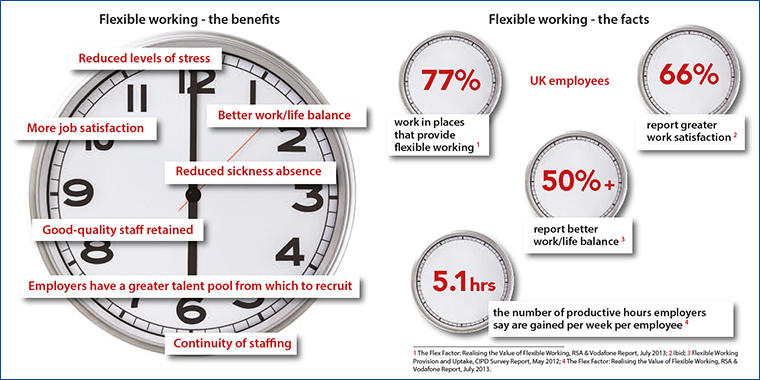Flexible working is a way of working that suits the needs of the employee.
It is a way of sharing, staggering or breaking up the normal working day or week in order to improve work/life balance.
All employees (not just parents or carers) have the legal right to request flexible working if they have worked for the same employer or at least 26 weeks.
The law does not give an automatic right to flexible working, but employers must respond to requests.
A teacher can only make a request under the legislation once in any 12-month period.
A request for flexible working must:
- be made well in advance of when you want it to take effect;
- be in writing;
- make clear that this is a statutory request;
- state the date of the application;
- make clear the change being requested to working arrangements, including the start date;
- state how this change might impact upon the school/college and how any such effect might be dealt with;
- include a statement saying if, and when, any previous application was made.
There is a flexible working policy that covers every Grant Aided School in Northern Ireland (TNC 2009/6).
If you fail to provide all the required information, then your employer does not have to consider your application until you have completed it.
Your employer should inform you if further information is required. Failure to provide information may result in your application being considered as withdrawn.
The employer has to consider a request for flexible working seriously.
The employer should consider a request in ‘reasonable manner’, which involves weighing up the benefits for the employee and the school/college against any potential adverse business impact.

If your employer does not agree to your request, a meeting should be held with you to discuss the reasons. This might also include discussing alternative working patterns, a trial period or a temporary change of up to a maximum of three years.
Discussions must take place at a mutually convenient time within 28 days of the employer receiving your application.
You are entitled to be accompanied at the meeting by either a work colleague (your employer must allow them paid time off during work hours) or a trade union representative.
If you fail to attend the meeting without a reasonable explanation, your employer can treat your application as withdrawn and you will not be able to make another application that year.
Once the meeting has taken place, your employer must write to you with a decision within 14 calendar days (this period can be extended by mutual agreement).
If the employer accepts the request, or accepts it with modifications, they should write to you confirming the following:
- the date of the communication;
- a description of your new working pattern;
- the date it will start.
If your employer rejects your request, you should be given in writing:
- the business ground(s) for refusing;
- an explanation why the business ground(s) apply to your application;
- details of your right to appeal;
- the date of the communication.
The statutory appeals process sets out your rights, including timescales and representation.
An employer can only reject a request for one of the following business reasons:
- the burden of additional costs;
- an inability to organise work amongst existing staff;
- a planned structural change to the business;
- a detrimental effect on the ability to meet customer demand;
- a detrimental impact on performance;
- a detrimental impact on quality;
- insufficient work for the periods the employee proposes to work;
- an inability to recruit additional staff.
Flexible working makes a positive contribution to the workplace.
The NASUWT is committed to campaigning to secure the right for all teachers to access flexible working opportunities.
The NASUWT is campaigning to secure the right to flexible working as a statutory entitlement.
Contact the NASUWT for further advice on flexible working.
Further advice
The DENI website provides the following guidelines:
- TNC 2009-7 Temporary variation of contract
- TNC 2009-6 Flexible working scheme
- TNC 2009-5 Career break scheme
- TNC 2009-4 Job share scheme for teachers
Your feedback
If you require a response from us, please DO NOT use this form. Please use our Contact Us page instead.
In our continued efforts to improve the website, we evaluate all the feedback you leave here because your insight is invaluable to us, but all your comments are processed anonymously and we are unable to respond to them directly.

